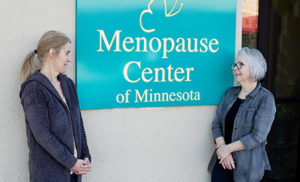 Menopause Center Administrator Coleen Boeckman (left) and Advanced Practice Registered Nurse/Certified Nurse Midwife Catherine Mascari (right). The center is at 576 Minnehaha Ave. W. (Photo by Margie O’Loughlin)[/caption]
Menopause Center Administrator Coleen Boeckman (left) and Advanced Practice Registered Nurse/Certified Nurse Midwife Catherine Mascari (right). The center is at 576 Minnehaha Ave. W. (Photo by Margie O’Loughlin)[/caption] By MARGIE O’LOUGHLIN
Menopause doesn’t get nearly the attention it deserves. The word is derived from Greek and means, literally, “the end of the monthly” – but it’s a long process, and it just isn’t that simple.
The Menopause Center of Minnesota offers education, counseling, and resources to help women 35 and older deal with issues and symptoms caused by perimenopause and menopause.
Becky Mendoza has been with the practice since it started 20 years ago. She is an advanced practice registered nurse and certified nurse practitioner with a focus on women’s health. She said, “Perimenopause and menopause can be very hard for women, but they don’t have to be. There are many ways we can help women be more comfortable, healthy, and symptom-free.”
Catherine Mascari was one of the Menopause Center’s first clients. She now works alongside Mendoza, and is an advanced practice registered nurse and certified nurse midwife. Mendoza and Mascari’s clients are healthy, low-risk women experiencing the physical, emotional, and psychological challenges of hormonal fluctuations during perimenopause and menopause.
Perimenopause is a transitional phase which typically begins in a woman’s late 30s or early 40s. It is the precursor to menopause. Ovarian function declines, and levels of the sex hormones estrogen and progesterone rise and fall unevenly.
In menopause, the ovaries are no longer producing estrogen or progesterone. Menopause is defined, in hindsight, as 12 consecutive months without a period. The average age for reaching menopause in the U.S. is 51 years.
Beginning in perimenopause, women may have hot flashes and night sweats – both of which can leave them wringing wet with sweat day or night. Many women experience something unaffectionately referred to as meno-fog: frequent lost trains of thought, lack of word recall, and cognitive dullness. Hormonal imbalances can trigger irritability, mood swings, depression, anxiety, and for some, a loss of libido (sex drive). Approximately 40% of women will continue to have symptoms years after menopause has occurred; the frequency and intensity of symptoms can range from pesky and infrequent to almost constant.
Mascari said, “It is a rare woman who has no problems or frustrations as she enters this time of significant change. An important aspect of self- care is to surround yourself with understanding, helpful, and courageous people.”
“Sometimes women don’t feel understood by their partners as they go through these changes. Men have a corresponding male menopause, but it usually isn’t as significant. We encourage all couples to take the effects of menopause seriously, and to work on having open, clear communication with each other.”
Personalized care
The Menopause Center is for women only, and limits its scope to a consulting practice. The clinicians do not perform physical exams, and there are no lab services available.
Mendoza explained, “Clients receive personalized guidance and counseling to help them manage their menopause transition with ease. Some women choose hormone therapy, and some do not. Some choose to take supplements such as calcium, magnesium, and vitamin D, and some do not.
“We are here to give clients the personalized care they might not get from their primary doctor, because this is our sole concern.”
The Menopause Center of Minnesota is located in the same building as Lloyd’s Pharmacy at 1576 Minnehaha Ave. W. They accept Blue Cross Blue Shield and Preferred One, and are able to arrange payment plans. Their telephone is 651.698.0891; web address is www.menopausemn.com.
Suggested resources: The Ultimate Guide to Dealing with Menopause by Robin Marantz Henig: Oprah Magazine (September 2019); The Wisdom of Menopause by Dr. Christiane Northrup.
“The changes of perimenopause and menopause occur spontaneously as women age. These changes bring opportunities for growth and new self-awareness – and they can be challenging.”~ Menopause Center of Minnesota
Tips from Catherine
Life style choices for better health in perimenopause and beyond:
✓ Consider a Mediterranean approach to food choices, more plant-based and fewer animal-based items.
✓ Stay flexible, balanced, and strong as you age. Try weight-resistance activities like swimming, interval walking, yoga or pilates for a minimum of 75 minutes/week.
✓ Limit caffeine intake and alcohol consumption.
✓ Stop cigarette smoking/vaping.
✓ Make yourself and your health a top priority.
Source: Catherine Mascari,
Menopause Center of Minnesota
Comments
No comments on this item Please log in to comment by clicking here